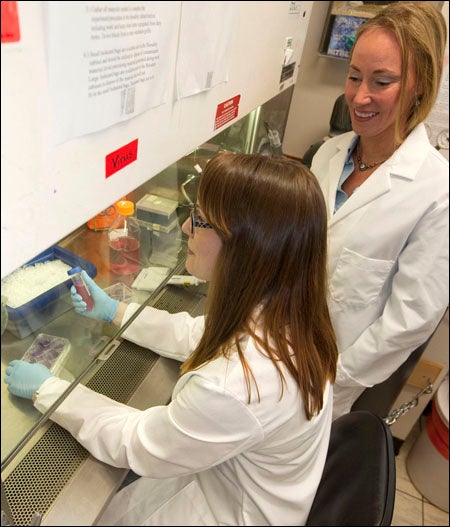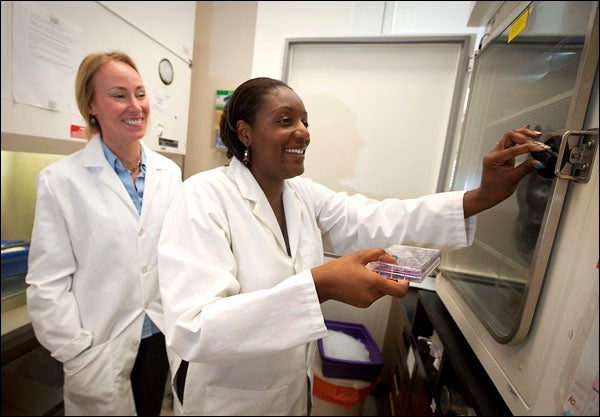OVERCOMING ROADBLOCKS
Scientist receives patent for poxvirus discovery
An East Carolina University scientist has received a patent for a discovery that could make certain vaccines safer for people with weakened immune systems and could make all vaccines of this type more effective.
Dr. Rachel Roper, an associate professor of microbiology and immunology at the Brody School of Medicine at ECU, received a patent last month for discovering and characterizing an immunosuppressive gene. She showed that removal of the gene significantly weakens the vaccine virus while simultaneously increasing immune responses to it.

Roper observes student Anastasia Weeks as she works in the lab.
The gene is the A35R poxvirus gene. With Roper’s discovery, biotechnology companies could use the procedure to develop improved vaccines for diseases such as monkeypox, HIV, tuberculosis, cancer, severe acute respiratory syndrome and other coronaviruses that are safer for people with compromised immune systems.
The poxviruses have been commonly used to develop vaccines in humans, but a key limitation has been what is called a “virulence gene.” Viruses, having co-evolved with humans over millennia, are uniquely adapted to exploiting vulnerabilities in human immune systems. These genes, of which A35R is one, suppress the immune system to allow the virus to proliferate in the human host.
Roper also believes that the A35R gene or a protein it produces may be used in cases where suppressing an undesirable immune response might help prevent issues like organ rejection after transplantation or autoimmune diseases, including multiple sclerosis and lupus.
From 2006 until now, she’s received more than $530,000 in grants to support her poxvirus research, including more than $240,000 from the National Institutes of Health.
ECU has been talking with biotechnology companies in hopes of licensing Roper’s discovery for use in a technology that can be brought to market, said Mark Foley, a licensing associate with ECU’s technology transfer office.
Roper has also worked with Dr. Emmanuel E. Zervos, a professor of surgery at ECU, to investigate ways her research could help get around a key roadblock in cancer vaccine development: the tendency of these viruses to suppress rather than strengthen the immune system.
The patent is No. 8202521. It is the second patent for Roper. In 2011, she received a patent for the SARS genome sequence and its use for diagnostic, therapeutic or vaccine purposes.
